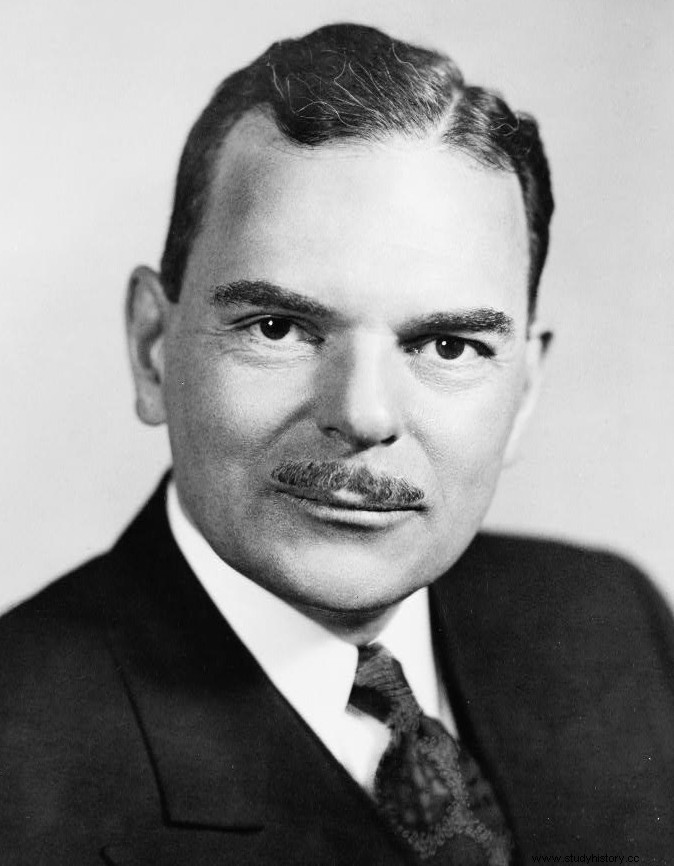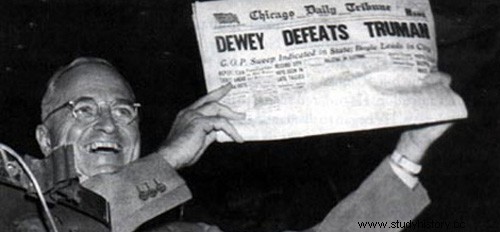The movie The Untouchables by Eliot Ness tells the story of the man who against all odds got the gangster America's most famous man, Al Capone, will end his days in Alcatraz prison. But there was another man who spent years in New York persecuting organized crime, who also managed to put several of the city's most important mobsters in jail and put several of the city's most important mobsters in jail, and who twice ran as a Republican candidate for United States presidency. In the second he became if possible more famous for a Chicago Daily Tribune cover story that became part of the history of journalism.
Thomas Dewey was a young assistant to the New York prosecutor in the early 1930s when he came to prominence as one of the few public officials who did not accept the generous financial contribution with which the city's mafia bribed politicians, policemen and members of the public. of the administration of justice so that they would not get involved in their business. Little by little, the figure of Charles Lucky emerged among the leaders of the New York mafia gangs. Luciano. He took advantage of the power struggle between the old guard of the Italian mafia in New York led by Joe Masseria and the new batch that arrived from Italy fleeing the persecution of the Mussolini regime led by Salvatore Maranzano.
After miraculously surviving a beating from the latter's henchmen (earning him the nickname Lucky ) Luciano allied himself with his aggressor to get rid of Masseria and organized his murder. But Luciano understood that Maranzano had not fulfilled the terms of the agreement on the distribution of the Masseria business and understood that it was a matter of time before Maranzano put a price on his head, so he decided to go ahead and be the one to end the life of his rival. . In this way, Luciano became the new boss of the New York mafia and sought peace with the rest of the families so that all of them could dedicate themselves to making the most of their illegal activities without infighting. A commission of the top five families in town was formed to approve the murder of anyone who posed a threat to the mob, and a group of expert thugs (known as Murder Inc.) was organized. ) to execute commission orders.

Assistant District Attorney Thomas Dewey put all his efforts into ending organized crime in the city, which meant reaching out to Luciano. But he was in a very high position and with his business protected by a spider web organized by his colleagues Meyer Lanski, Bugsy Siegel, Frank Costello, and Vito Genovese. So Dewey decided to start his investigations with a less important figure, thus trying to advance little by little in the pyramid of the mafia organization until he reached Luciano.
To do this he set his sights on a stubbornly independent mobster named Dutch Schultz. After unsuccessfully pursuing Schultz for a while, Dewey got him arrested and put on trial for a tax offense; but mob lawyers arranged for the trial to take place in the small town of Malone in upstate New York, where Schultz was acquitted of the charges. Back in New York, he tried to convince the commission to order Dewey's murder, but Luciano and the other members of the commission refused to do so. Not only that, but upon learning that Schultz was organizing Dewey's murder on his behalf, he went to Dutch whom the commission decided to eliminate.
Schultz's death did not deter Dewey, who continued to bring members of the mob to trial, obtaining 72 convictions in 73 trials, although the jackpot remained elusive to his investigations. Until suddenly Dewey was presented with the opportunity he had been waiting for years. Ignoring Meyer Lansky's advice, Luciano decided to enter the prostitution business in New York and Dewey managed to pull the strings of Luciano's organization in the New York brothel business through a recording (a pioneering system at the time). , until he managed to get more than fifty prostitutes to agree to testify against him.
But it was one thing to have evidence against Luciano and quite another to bring him to trial and, above all, to do it in New York, which was essential for Dewey. Luciano was arrested in the town of Hot Springs (Arkansas), which was a refuge for gangsters and whose local and state authorities the criminal organization "had on the payroll." From there, a tough legal battle began between his and Dewey's lawyers to decide whether or not Luciano was transferred to New York. Seeing the matter getting bogged down in complicated legal discussions, Dewey decided to pressure the Arkansas authorities with an aggressive press campaign. This strategy paid off and finally the trial of Lucky Luciano took place in New York; The mobster's desperate maneuver to defend himself failed to prevent him from being found guilty and sentenced to fifty years in prison.
Luciano's replacement at the head of the family, Vito Genovese, had to flee to Italy to avoid being arrested and tried by Dewey, who had a stroke of luck when one of the members of Murder Inc. named Abe Reles was arrested for a crime of passion and decided to collaborate with Dewey by ratting out the other members of the organization. Reles was eventually killed by the mob, but his testimony had already caused enormous damage. Luciano, who continued to organize his family's affairs from the prison where he had bribed a good part of the guards and the rest of the inmates and where he lived like a king, however, was not satisfied with the situation... but that is another story.
Although Reles's death was an inconvenience in Dewey's investigations, he had already achieved a notoriety that became a springboard for his entry into political life. Elected New York City Attorney in 1937, he succeeded after two unsuccessful attempts to become Governor of the state in 1942. Dewey was a rising star in the Republican Party and secured the Republican Party's nomination for President of the United States in 1944. However, with the A country at war and facing a candidate as formidable as Francis D. Roosevelt, Dewey had no chance and was defeated.
But the circumstances were very different in the presidential elections of 1948. The war was over, Roosevelt had died and his death was replaced by Vice President Truman, who after three years of presidency faced for the first time the challenge of being appointed president in the elections. urns. The Republican Party again nominated Dewey as a candidate to take on Truman.
The vote count of the elections of November 3, 1948 showed an equal and uncertain result. It was then that the cover of the Chicago Tribune (facing a strike threat from his printers) jumped the gun and published a headline that has gone down in history:"Dewey Defeats Truman." The vote count was not yet complete, but the Tribune (of a clear Republican tendency) was carried away by the forecasts of his political correspondent in Washington Arthur Sears Henning, who had been successful in four of the last five presidential elections. More than 150,000 copies of the newspaper were printed and put up for sale.

However, when the vote count was finally finished, Truman had narrowly won, making the wrong front page of the Tribune became one of the most remembered in the history of journalism in the United States.
Dewey's role in the Republican party faded into the background after his new defeat at the polls and the anecdote that accompanied it, but he still had time to be an important figure in convincing the hero of World War II , General Dwight Eisenhower to lead the Republican presidential candidacy in 1952 and win the White House for his party.
After these elections Dewey decided to open a law firm and dedicated the rest of his days to a lucrative professional practice until his death in 1971.
